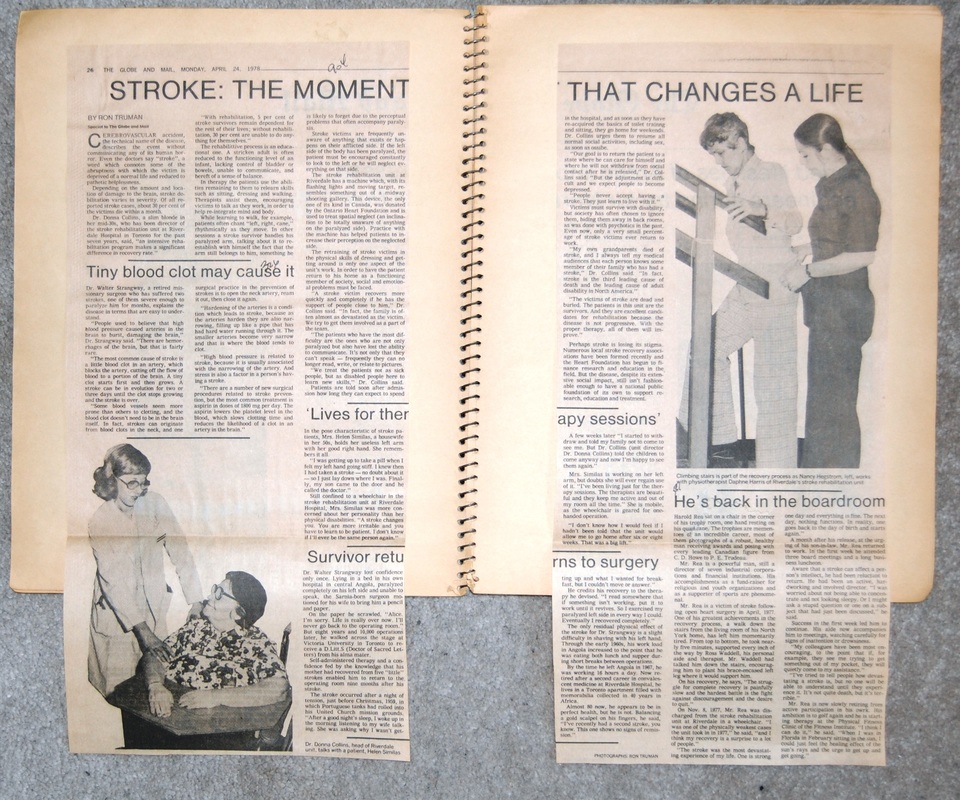|
My first efforts at stroke awareness were in Canada's national newspaper, The Globe and Mail, in 1978. See the photo of my scrapbook page at left. The Heart and Stroke Foundation needed a writer who could add stroke information to its literature in the mid-1980s. I spent three years writing backgrounders, news features and even articles for medical journals for the HSF. More than 20 years passed before my interest in writing about stroke was revived. I had two strokes. I am alive only because of incredible advances in dealing with stroke. After being dead for about 20 seconds, endovascular treatment removed the clot from my brain. I pitched a story on this to my old newspaper. But no interest. So I devoted the last part of my memoirs to my experiences with promoting stroke awareness and having strokes. Perhaps the lack of interest was due to no hope for something like a cure for a stroke. That is changing. |
The "Breakthrough Moment" has finally arrived. Stroke victims were once rolled into a back room and left to die. Today, if they are rolled into an operating theater where an interventional radiologist or a neurointerventional surgeon can care for them, there is hope. If a blood clot causing a stroke is removed from the brain quickly, victims have a good chance of returning to normal life. This is not a dream. It is a reality, tested around the world and being manufactured. See the interview below with the president of Penumbra Inc as his company is listed on the NYSE and the stock begins to soar.
It's more important than ever that stroke is immediately diagnosed and treated. People are being encouraged to learn the symptoms and to seek treatment as quickly as possible. Millions of brain cells are dying every minute. You want to put a halt to that as soon as possible. My stroke prevention nurse advises calling 9-1-1 immediately so that the medics who load you onto the stretcher can start evaluating your condition immediately. Even if you are just across the street from the hospital, call 9-1-1.
I've met people who have been taken into the hospital paralyzed and unable to speak--and were able to walk out of the hospital a few days later with no deficits. Your future may depend on finding out what the letters in the acronym FAST mean and taking all the suggested actions with no delays.
In my years of writing about stroke, I met and interviewed many victims who were wheelchair-bound and suffering deficits that left them physically unable to feed themselves or unaware of anything on one side of their body. The lead for one of the news releases I wrote for the Heart and Stroke Foundation about 30 years ago read, "If you think of stroke survivors as pitiful creatures, eyes filled with terror and anguish, confined to wheelchairs or walkers, perhaps unable to speak or understand what they hear . . . ."
Today, if you are unlucky enough to have a stroke, you have a chance to avoid that kind of future. But you have to educate yourself to recognize the symptoms and push to have the appropriate treatment immediately available in a nearby hospital.
I've met people who have been taken into the hospital paralyzed and unable to speak--and were able to walk out of the hospital a few days later with no deficits. Your future may depend on finding out what the letters in the acronym FAST mean and taking all the suggested actions with no delays.
In my years of writing about stroke, I met and interviewed many victims who were wheelchair-bound and suffering deficits that left them physically unable to feed themselves or unaware of anything on one side of their body. The lead for one of the news releases I wrote for the Heart and Stroke Foundation about 30 years ago read, "If you think of stroke survivors as pitiful creatures, eyes filled with terror and anguish, confined to wheelchairs or walkers, perhaps unable to speak or understand what they hear . . . ."
Today, if you are unlucky enough to have a stroke, you have a chance to avoid that kind of future. But you have to educate yourself to recognize the symptoms and push to have the appropriate treatment immediately available in a nearby hospital.

